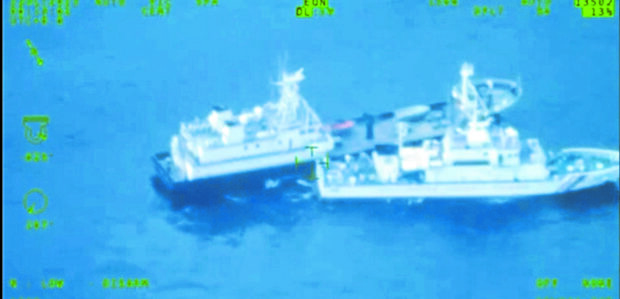
HARASSMENT AT SEA A China Coast Guard vessel (right) blocks a Philippine boat carrying supplies for military troops on BRP Sierra Madre.
Several members of the US House of Representatives have condemned Beijing for “intentionally hitting” Filipino vessels as part of its “aggressive and provocative behavior” in the South China Sea as they also lauded the US government’s plan to step up joint patrols with the Philippines and other allies in the area.
In a statement issued on Oct. 24, House foreign affairs committee chair Rep. Michael McCaul, ranking member Rep. Gregory Meeks, House Indo-Pacific subcommittee chair Rep. Young Kim and ranking member Rep. Ami Bera expressed their “unequivocal support” for the Philippines in its maritime conflict with China.
“We condemn Beijing’s maritime intimidation and welcome the Biden administration’s announcement to increase joint patrols with the Philippines and other partners in the South China Sea,” they said.
The US lawmakers also backed the Biden administration’s “reaffirmation” of its commitment to the US-Philippines Mutual Defense Treaty (MDT).The statement was issued after a China Coast Guard vessel hit a Filipino boat conducting a rotation and reprovisioning (Rore) mission to BRP Sierra Madre, the Philippines’ military outpost on Ayungin (Second Thomas) Shoal, on Oct. 22. This was followed by another collision between a Chinese maritime militia vessel and a Philippine Coast Guard (PCG) ship escorting the resupply boat. The incident drew widespread condemnation for Beijing, which insists it has sovereignty over almost the entire South China Sea, despite the 2016 arbitral award that declared its claim to be without legal basis. ‘Part of larger pattern’
The US lawmakers noted how the “Chinese Coast Guard and maritime militia vessels intentionally hit Philippine Coast Guard ships over the weekend and continue to violate international law, endanger Filipino crew members, and obstruct Philippine vessels’ access in their own exclusive economic zone.”
“This incident is part of a larger pattern of the People’s Liberation Army, Navy, the Maritime Militia and the Chinese Coast Guard’s aggressive and provocative behavior in the South China Sea, where it actively intrudes in other states’ exclusive economic zones,” they added. Earlier, the US Department of State also expressed its support for the Philippines and reaffirmed that “Article IV of the 1951 US-Philippines MDT extends to armed attacks on Philippine armed forces, public vessels and aircraft—including those of its Coast Guard—anywhere in the South China Sea.”
More willing nations
Defense Secretary Gilberto Teodoro Jr. said in an interview on PTV 4 on Wednesday that the country would boost multilateral activities, including freedom of navigation patrols in the West Philippine Sea (WPS).
He stressed that the Oct. 22 incident “could result in more willing nations to join our fight” although he did not elaborate on what that would entail.
At the Kapihan sa Manila Bay forum, Armed Forces Chief of Staff Gen. Romeo Brawner Jr. said they were exploring possible joint resupply missions in the WPS with other countries following the twin collisions. “We are studying it. That’s another option,” he told reporters.
In previous months, the AFP and PCG had conducted bilateral joint sails in the WPS with the country’s defense allies, including the United States, Australia, Japan and Canada. Malaysia, France, India and Singapore had also expressed interest in participating.
“But what we need is regularity [of joint patrols]. We don’t want to be dependent on which ships will arrive [if we will do joint patrols],” Brawner said.
According to the AFP chief, they were also considering using a Philippine Navy vessel to carry out Rore missions as it was more equipped for such operations.
As for the BRP Sierra Madre, Brawner said the country was well within its rights to repair the rusting World War II ship that was deliberately grounded in waters near Ayungin Shoal in 1999.
“For me, I really believe we have the right to repair it because this is a commissioned Philippine Navy ship. Even if it’s located in Ayungin, we have the right to repair it,” he added.
Brawner noted how China had installed missile systems on its man-made islands in the South China Sea but had the audacity to block the Philippines from repairing its ships within its territory.
“We did not interfere when they were militarizing the artificial islands. Now they’re being rattled when they’re called out. That’s a huge imbalance,” he said.
But at the same time, Brawner expressed concern that China may further escalate its harassment of Filipino vessels in the WPS. “We fear that in the future, their ships will deliberately hit our vessels,” he said. “We are the ones always trying to avoid any collision. We stop our ships each time they conduct these dangerous maneuvers, crossing the path of a vessel that was moving forward. That’s very dangerous and should not be done. It’s not allowed under maritime rules [which China should also follow].”
Despite this possibility, he assured the public that they would be ready to defend the country’s territory.